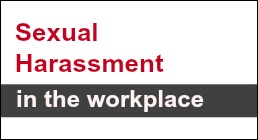
All employees are legally protected from sexual harassment in the workplace. Roisin Kelly, from the Equality Commission's Advisory Services Team, looks at the practical procedures employers can use to address it.
.JPG)
Recently there have been a significant number of high profile cases of sexual harassment in the media, which serve as a reminder not only of the ongoing prevalence of this issue, but also of the importance of putting in place strategies to effectively prevent and address sexual harassment in the workplace. All employees are legally protected from sexual harassment in the workplace, and the Commission supports employers to manage workplace harassment.
Sexual harassment is unwanted conduct of a sexual nature which has the purpose or effect of violating a person’s dignity, or creating an intimidating, hostile, degrading, humiliating or offensive environment for them. Something can be considered sexual harassment even if the alleged harasser didn't intend it to be, and it doesn't have to be intentionally directed at a specific person. Sexual harassment can happen in a number of ways, for instance:
- written or verbal comments of a sexual nature such as remarks about a colleague's appearance, questions about their sex life or offensive jokes
- displaying pornographic or explicit images
- sending or forwarding on emails that contains content of a sexual nature
- unwanted physical contact and touching
- sexual assault
Organisations should clearly communicate the type of behaviours which are likely to be unacceptable and be considered sexual harassment to employees and all other relevant parties (such as contractors).
The Commission recommends employers develop practical procedures to address sexual harassment, which should be based on sound policies. For instance, we recommend you develop a written anti-harassment policy and procedure, underpinned by a corporate equal opportunities statement, and a joint declaration of protection signed by both management and employees’ representatives.
This policy should be effectively communicated to employees so that they are aware of their responsibilities and rights under that policy, and training should be provided on the policy to ensure all relevant parties understand, for instance, the types of behaviour are acceptable and unacceptable in the workplace. The training should also convey the employer’s commitment to the equal opportunities policy, and management / supervisory level staff should be given additional training, which focuses on their responsibilities for implementing anti-harassment policies and dealing effectively with complaints, should they arise, in line with the procedure. Policies should be monitored and evaluated on an ongoing basis to ensure effectiveness.
All complaints of sexual harassment should be taken very seriously and handled fairly and sensitively, in line with company policies.
We recognise that employers' needs differ across sectors and businesses – therefore we tailor our services to meet employers’ needs, and offer a wide range of resources and services for employers to effectively manage issues such as sexual harassment in the workplace, such as help with policy development and review, equality training sessions for employers on a range of issues including workplace harassment, as well as a number of publications outlining the law and good practice.
You can contact us via email at edenquiries@equalityni.org or phone our enquiry line on 028 9089 0888 to speak confidentially to a member of our staff.
Useful publications:
Posted on 18 Dec 2017 by
Roisin Kelly